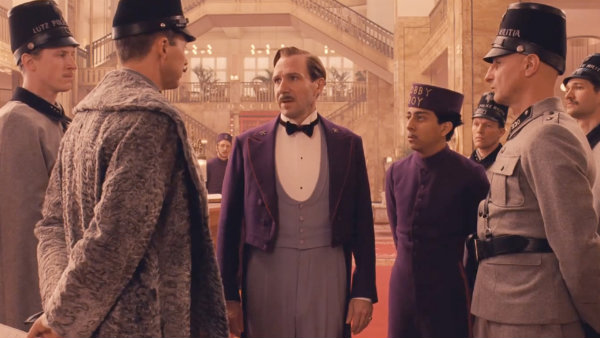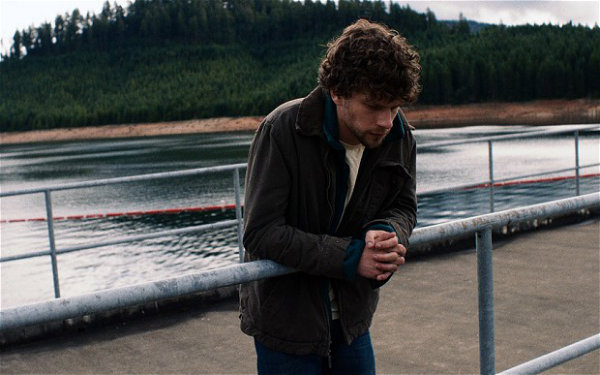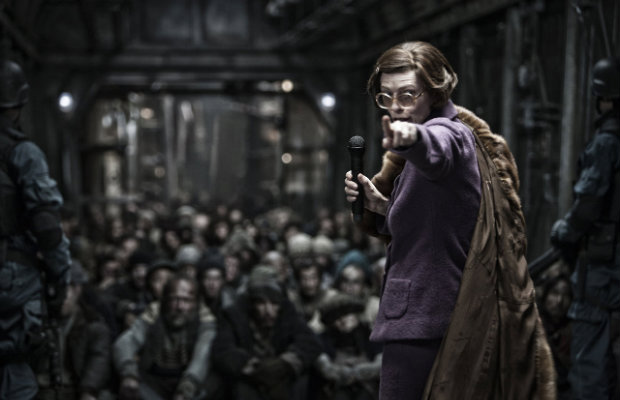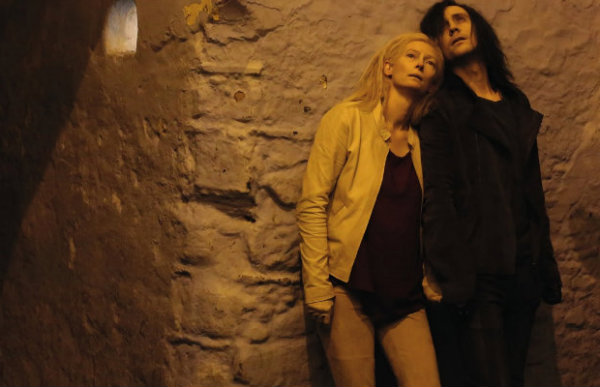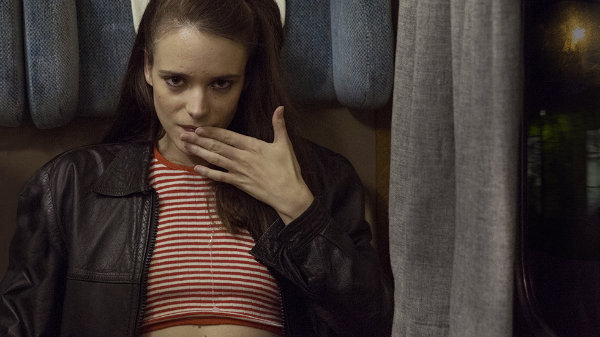#10. The Grand Budapest Hotel
Had I not revisited this upon its blu-ray release earlier this summer, it’d have been at #5 on this list. This is in large part due to the fact that Anderson’s sense of humor only really works for me when I’m watching his films in a theatre, surrounded by people who get off on it; their laughter is contagious enough that I’m able to stop wincing at its awkwardness and join in. Viewed in solitude, it’s just the same old strained, self-conscious dead pan that sign posts its cuteness to the point that I’m more an observer than a participant to the jokes. The Royal Tenenbaums never had this problem, because it’s more than just a (very impressively produced) set of winks and gags. Still, it’s undeniably entertaining and immaculately constructed as a throwback caper, and Tilda Swinton’s two minutes of screen time further reveals her to be her generation’s greatest actor.
#9. Night Moves
Funny how so many are up in arms about Reichardt appropriating the title of Arthur Penn’s 1975 “masterpiece,” since all this title makes me think of (or hear, rather) is the Bob Seger song. Anyway, funny how the Reichardt film isn’t so funny in the end (it is a Reichardt film after all), but a self serious and sententious environmental message movie. Reichardt is a smart enough artist, though, that her film eventually opens up, and in the end becomes a fascinating entry in her recent string of films (beginning with Wendy and Lucy) that are ultimately about the futility of individuals or small groups trying to stand up against/move away from the dominant powers and systems that shape society as we know it. A downer, but vital.
#8. Coherence
Schrödinger’s Cat: The Movie. A simple idea with complex ramifications. Part of the growing tradition of heady, indie sci-fi for which Shane Carruth’s Primer might be called the godfather. The title for James Ward Byrkit’s debut is not ironic, surprisingly.
#7. Snowpiercer
The perfect amalgam of blockbuster and heady environmental dystopia. Surprising to see a train movie that doesn’t immediately get lumped into a Lumiere bros., origins of cinema discourse, but then it does become self-reflexive in other, unexpected ways, as the trek through the train cars ushers in different genres of cinema, new strategies of mise en scene. Not irrelevant to the film’s artistic success: Tilda Swinton is in this movie.
#6. Only Lovers Left Alive
An auto-critique of Jarmusch’s own elitism. The first great post-Detroit city symphony about Detroit. A nostalgia trip through rock and roll history. A movie for Tilda Swinton to act in. A slowed-down mix of Wanda Johnson’s “Funnel of Love.” Einstein’s theory of entanglement. Raindrops on roses. Whiskers on kittens. These are a few of what ought to be everyone’s favorite things.
#5. Under the Skin
Brilliant, visionary sci-fi with muddled ideas on what it wants to do with itself. After reading the book, it becomes clear that Glazer was more interested in the tone than the ideas of Faber’s scenario, which is fine when the tone is so magisterial. A film with a feminist message? An ode to humanism? A cry against intolerance? Who knows. Who cares.
#4. Nymphomaniac, Vol. I + II
Reserving final judgment until the uncut version of both volumes become available, because who really cares about a compressed arrangement of several hours of Lars von Trier images? As is, it still suggests a masterpiece—one of the great films about storytelling, the catharsis of recollection, and the potentially brutal consequences of mis-interpretation. There is no objective viewpoint in humanity; everyone takes a side.
#3. Stranger by the Lake
Not much more needs be said about Alain Guiraudie’s breakthrough film, which blew away Cannes audiences more than a year ago now, and finally got him the attention he’s deserved since his career began. It’s less weird and impulsive than what his fans have come to expect from his narratives, but still relentlessly non-conformist, and the closest queer cinema has gotten to pure art since Tropical Malady put Thailand’s national cinema on the map.
#2. Norte, the End of History
Minor Lav Diaz (that is, a “short”), but also his first film that seems to actively appear as if he wants an audience; it’s not only shorter, but framed in the cinematic 2.35:1 ration, in lusciously rustic color, and shaped around a narrative (Crime and Punishment) people are familiar with. Helicopter cam evokes a greater sense of spirituality than the miracle seen in overtly spiritual final hour, but then every four-hour film’s ending tends to feel like a miracle so one hardly even notices that levitation has become art cinema shorthand for transcendence. Its a film you live through rather than one you see.
#1. MANAKAMANA
The Sensory Ethnography Lab at Harvard have been churning out the most experimental (and, frankly, best) documentaries since the perceptually ravishing Sweetgrass appeared in 2009, a film that offered the promise of new directions and possibilities in doc-making—confirmed when the atom bomb that is Leviathan dropped three years later. MANAKAMANA combines the sensibilities of those Lucien-Castaing Taylor projects with a base derived from James Benning’s Twenty Cigarettes, which itself was recalling Warhol’s signature screen test films. Part contemplative portraiture and part experiment in narrative construction, it’s 2014’s most radical and serene commercial release to date.
[Editor’s note: The following list are for films that, a. premiered after July 1st, b. have a pending release sometime this year or c. were viewed this year on the festival circuit and could also fall in either categories.]


